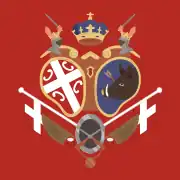Cabinet of Matija Nenadović
The cabinet of Matija Nenadović was formed on 27 August 1805. It was the first government of Serbia. It held office until April 1807, when it was replaced by the cabinet of Mladen Milovanović.
Cabinet of Matija Nenadović | |
|---|---|
 Cabinet of Revolutionary Serbia | |
| 1805–1807 | |
.jpg.webp) | |
| Date formed | 27 August 1805 |
| Date dissolved | April 1807 |
| People and organisations | |
| Head of state | Đorđe Petrović |
| Head of government | Matija Nenadović |
| Total no. of members | 12 |
| History | |
| Successor | Milovanović |
Timeline
Following the slaughter of the Knezes in 1804, a group of leading Serbs decided to begin an uprising against dahijas; they soon after elected Đorđe Petrović, a merchant better known as Karađorđe, as their leader.[1]: 200 His forces assumed control of Požarevac, Šabac, Smederevo, and Belgrade, after which they held Austrian-mediated negotiations with the Ottomans in order to secure autonomy for the Serbs.[2]: xviii–xix The negotiations broke down in 1805, after which the Battle of Ivankovac occurred, in which the Serb forces were defeated.[1]: 200 [2]: xix Dukes Jakov Nenadović, Matija Nenadović, Milan Obrenović, and Sima Marković, with the assistance of Adam Jerzy Czartoryski, the minister of foreign affairs of the Russian Empire, proposed the creation of a government in order to limit Karađorđe's powers.[3] Karađorđe accepted the formation of the government on conditions that the government would help him with military and foreign policy.[4]
This led to the formation of the first government of Serbia, known as the Serbian Governing Council (Serbian Cyrillic: Правитељствујушчи совјет сербски, romanized: Praviteljstvujušči sovjet serbski; lit. 'Serbian Soviet').[4][5][6] With the Assembly of Uprising Champions, it represented the authority in Revolutionary Serbia.[7] The government organized and supervised the administration, economy, judiciary, foreign policy, order, and the supply of arms for Serb forces.[5] The founding assembly of the Governing Council was held on 14 August 1805 in Marković's house near Barajevo.[4][8] Together with his cabinet, Matija Nenadović was appointed president of the Governing Council on 27 August 1805.[7][9]: 7
The government's headquarters were initially at Voljavča and then at Bogovađa, although it was later moved to Smederevo.[4][6]
Composition
The cabinet was composed of 12 representatives from 12 nahiyahs from among whom the president was elected every month.[4] Considering that the representatives of the Governing Council changed frequently, it is hard to determine all of its representatives and when they served as representatives.[10]
According to historian Radoš Ljušić, the first composition included Mladen Milovanović, Avram Lukić, Jovan Protić, Pavle Popović, Velisav Stanojlović, Janko Đurđević, Đurica Stočić, Milisav Ilijić, Ilija Marković, Vasilije Radojičić, Milutin Vasić, and Jevta Savić Čotrić.[10] In late 1805, the cabinet only included Jakov Nenadović, Janko Katić, Milenko Stojković, Luka Lazarević, and Milan Obrenović, with Nenadović as president.[10] According to Vuk Karadžić, the following representatives were:
| Office | Name | Ref(s) |
|---|---|---|
| President of the Governing Council | Matija Nenadović | [9]: 7 [11] |
| Kragujevac nahiyah representative | Mladen Milovanović | [9]: 7 |
| Požega and Rudnik nahiyah representative | Avram Lukić | [9]: 7 |
| Požarevac nahiyah representative | Jovan Protić | [9]: 7 |
| Belgrade and Grocka nahiyah representative | Pavle Popović | [4][9]: 7 |
| Jagodina nahiyah representative | Velisav Stanojlović | [9]: 7 |
| Smederevo nahiyah representative | Janko Đurđević | [9]: 7 |
| Ćuprija nahiyah representative | Milija Zdravković | [9]: 7 |
| Valjevo nahiyah representative | Milisav Ilijić | [9]: 7 |
| Užice nahiyah representative | Vasilije Radojičić | [9]: 7 |
| Soko nahiyah representative | Milutin Vasić | [9]: 7 |
| Zvornik nahiyah representative | Jevta Savić Čotrić | [9]: 7 |
Aftermath
Nenadović stepped down as president of the Governing Council in April 1807.[12] He was succeeded by Mladen Milovanović, who headed the government until 1810.[12]
References
- Jelavich, Barbara (1983). History of the Balkans. Cambridge: Cambridge University Press. ISBN 0-521-25249-0. OCLC 9043005.
- The revolt of the Serbs against the Turks : 1804-1813. W. A. Morison. Cambridge: Cambridge University Press. 2012. ISBN 978-1-107-67606-0. OCLC 758397343.
{{cite book}}: CS1 maint: others (link) - Janković, Dragoslav (1955). Istorija države i prava Srbije u XIX veku (in Serbian). Nolit. p. 18.
- "Danas je 205 godina od uspostavljanja prve srpske vlade". Politika (in Serbian). 27 August 2010. Retrieved 30 October 2022.
- Čubrilović, Vasa (1982). Istorija političke misli u Srbiji XIX veka (in Serbian). Narodna knjiga. p. 65.
- Bataković, Dušan T. (2014). The foreign policy of Serbia (1844-1867) : Ilija Garašanin's Načertanije = La politique étrangère de la Serbie (1844-1867) : Načertanije d'Ilija Garašanin. Belgrade. p. 53. ISBN 978-86-7179-089-5. OCLC 974706819.
In 1805, the Governing Council held its sessions in Smederevo, the 'capital of our despots and emperors'...
{{cite book}}: CS1 maint: location missing publisher (link) - "Istorija srpskih vlada". Politika (in Serbian). 16 May 2007. Retrieved 30 October 2022.
- "Vlada da vlada". Politika (in Serbian). 14 August 2015. Retrieved 30 October 2022.
- Stefanović Karadžić, Vuk (1860). Praviteljstvujušči sovjet serbski za vreme kara-Đorđijeva ili Otimanje ondašnjih velikaša oko vlasti (PDF). Vienna. Retrieved 30 October 2022.
{{cite book}}: CS1 maint: location missing publisher (link) - Ljušić, Radoš (2005). Vlade Srbije: 1805-2005 (in Serbian) (1 ed.). Belgrade: Zavod za udžbenike i nastavna sredstva. p. 65. ISBN 86-17-13111-X. OCLC 67978385.
- Calic, Marie-Janne (2019). The Great Cauldron: A History of Southeastern Europe. Cambridge, Massachusetts: Harvard University Press. p. 211. ISBN 9780674983922. Retrieved 30 October 2022.
Nenadović, who was in his late twenties, was one of the uprising's most prominent leaders and commanders, and he later became the first prime minister of Serbia.
- Nenadović, Matija (1969). The Memoirs of Prota Mateja Nenadović. Ann Arbor, Michigan: Clarendon Press. p. xxii. ISBN 9780198214762. Retrieved 30 October 2022.
He finally gave up his post as President of the Legislative Council in April 1807, and his place was taken by Mladen Milovanović.